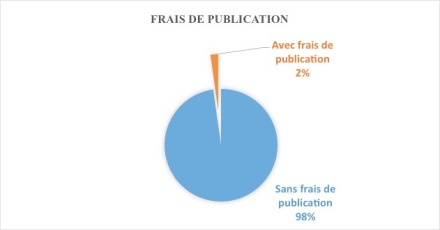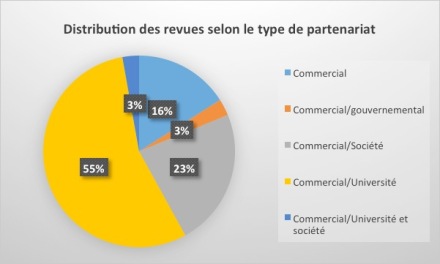by Myriam Dumais-DesRosiers et Widlyne Brutus; translated by Heather Morrison
Abstract (français)
The commercial publisher De Gruyter, not even listed in the Directory of Open Access Journals (DOAJ) in 2014, is now the 3rd largest publisher of open access scholarly journals in DOAJ. Two factors that can explain this large increase of the publisher: the first is the purchase of other open access publishers (for example, Versita and Berkeley Electronic Press), the second is partnerships that De Gruyter has undertaken with a number of societies and universities, primarily in Eastern Europe.
Details
The commercial publisher De Gruyter, that as of 2014 was not included in the Directory of Open Access Journals (DOAJ), was, in November 2015, the 3rd largest publisher of open access journals in DOAJ by number of journals(https://sustainingknowledgecommons.org/2015/10/22/top-10-publishers-in-doaj-by-number-of-titles-2014-to-2015/). One reason for this large increase is the purchase of other open access publishers (for example, Versita and Berkeley Electronic Press), another is partnerships that De Gruyter has undertaken with a number of societies and universities, primarily in Eastern Europe. This sudden growth is not the only interesting aspect of this publishing house. Among the journals published by De Gruyter, only 2% charge article processing fees, the others preferring to assume the production costs themselves.
Tableau 1

The journals that charge article processing fees are all commercial, without society / university partnerships. To put this another way, none of the journals produced in these partnerships charge APCs and all leave copyright in the hands of the authors. The division of types of partnerships is as follows:
• 16% commercial only
• 3% commercial / government
• 23% commercial / society
• 3% commercial / society / university
• 55% commercial / university
Tableau 2

In conclusion, one might say that De Gruyter, whose activities used to be very traditional, took a considerable turn towards open access to becomes the 3rd largest publisher in DOAJ, and this without charging article processing fees for the majority of authors or asking for copyright transfer. It remains to be seen whether this model will continue.
Cite as:
Dumais-DesRosiers, M., Brutus, W., & Morrison, H. (transl.). (2016). De Gruyter Open (english). Sustaining the Knowledge Commons / Soutenir Les Savoirs Communs. Retrieved from https://sustainingknowledgecommons.org/2016/04/27/de-gruyter-open-english/
This is not only about Central Europe. De Gruyter Open co-publishes 571 serials in cooperation with 270 various institutions from 38 countries around the world. http://openscience.com/open-access-a-common-effort/
hank you Witold Kieńć. Openness and transparency from my perspective are good qualities for any organization or business, I appreciate the contribution of De Gruyter to this conversation. If you have any further information, please let me know. What would be most helpful to SKC is information about the platinum model or no-fee journals – how this works, and if De Gruyter and its partners see this continuing indefinitely, as well as a spreadsheet with a full list of journals, partnerships, whether there is a publication fee or not, and if so, how much / how it works and in what currency. It is a lot to ask, I know, I am just mentioning this on the theory that my chances of getting the info are better if I do ask than if I don’t. Thanks again